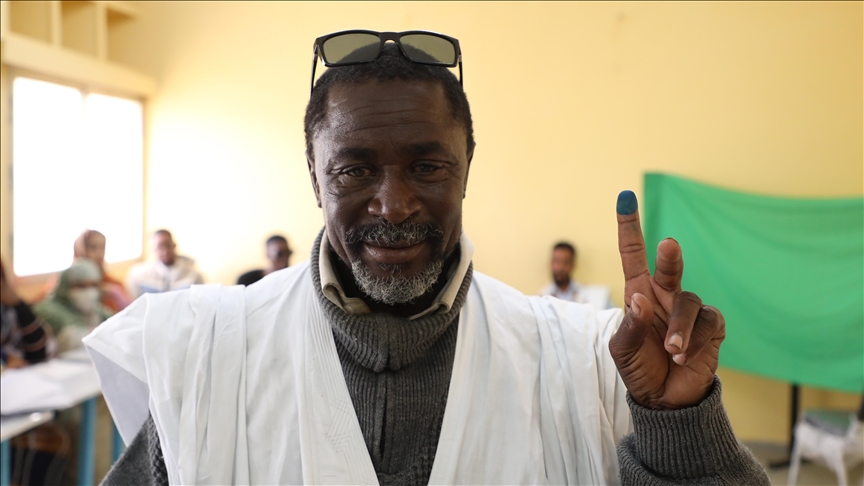FACTBOX - Mauritania’s presidential election: All you need to know
Seven candidates are in the race including incumbent President Ghazouani, Biram Dah Abeid and Hamadi Ould Sid' El Moctar
 General and local elections in Mauritania
General and local elections in Mauritania
- There are 1.9 million registered voters in the country of some 4.5 million people
- 'Ghazouani will win because of the usual advantages of incumbency,' says analyst Gilles Yabi
JOHANNESBURG
Voters in the Islamic Republic of Mauritania will head to the polls to elect a new president on June 29 in a race that has drawn seven candidates, including the incumbent Mohamed Ould Cheikh El Ghazouani.
There are 1.9 million registered voters in the country of some 4.5 million people, according to figures from the Independent National Electoral Commission (CENI).
Biram Dah Abeid, 59, is the most outstanding challenger to the 67-year-old incumbent. The human rights activist and anti-slavery campaigner is not new to politics, as he contested for the top job in 2019 and came second with 18% of the vote.
He is campaigning against the marginalization of the country’s Black African population and the government's human rights track record.
Despite Mauritania abolishing slavery in 1981, some forms of slavery reportedly continue in parts of the country, according to a UN report.
Another strong contender in the elections is 49-year-old Hamadi Ould Sid' El Moctar, the leader of the National Rally for Reform and Development, also known as Tewassoul.
Moctar wants to end mismanagement of public funds and corruption and develop the country with its vast natural resources.
In 2019, Ghazouani won the presidential election with 52% of the vote, succeeding President Mohamed Ould Abdel Aziz.
Mauritania, which was hit by a series of coups from 1978 to 2008, witnessed history in 2019, when there was a peaceful transfer of power for the first time since independence in 1960.
Aziz, who was elected president in 2009 after overthrowing President Sidi Ould Cheikh Abdallahi in a coup, stepped down in 2019 after completing his two-term limit in office.
However, in December, a court in Mauritania jailed Aziz, now 67, for allegedly amassing wealth corruptly, a charge he denies.
Ghazouani to win
Gilles Yabi, founder of the West Africa Citizen Think Tank (WATHI) based in Senegal, told Anadolu that he thinks Ghazouani will win the polls.
For the challengers, he said Abeid is the most well-known candidate, but none are likely to pose a serious threat to Ghazouani.
“Ghazouani will win because of the usual advantages of incumbency and has the typical profile of presidents of Mauritania, being a former general, head of the army and minister of defense,” Yabi said in a phone interview.
“It is extremely difficult to think that there will be a surprise in who wins these elections,” he said.
The African Union Commission this week sent its Electoral Observation Mission to Mauritania.
The mission is comprised of 27 short-term observers, who include ambassadors to the African Union in Addis Ababa and members of the Pan-African Parliament.
Why are these elections important?
Yabi says the elections are important because Mauritania has been making small steps in building a democratic country, even if reducing the political influence of the army is still a challenge.
He also says the country is strategically important owing to its geographic placement between North Africa and West Africa or Sub-Saharan Africa.
“Mauritania has been the only country able to reduce insecurity in the Sahel, and it has not experienced a terrorist attack for many years now,” he noted.
A report by Germany's Konrad Adenauer Stiftung foundation says Mauritania has gained importance for the European Union in recent years in the Sahel region, where several countries including Chad, Mali, Burkina Faso and Niger have experienced coups.
After coup leaders asked Western countries to leave Mali, Burkina Faso and Niger, Mauritania is now the only partner the EU has in the fight against militants.
According to Konrad Adenauer Stiftung, the EU has concluded security and migration cooperation agreements with Mauritania.
Mauritania also has economic opportunities due to the number of natural resources it has, including gas, which is being developed with Senegal. But it’s also a source of renewable energy, particularly solar power, and is promising in terms of energy developments, said Yabi.
Anadolu Agency website contains only a portion of the news stories offered to subscribers in the AA News Broadcasting System (HAS), and in summarized form. Please contact us for subscription options.

